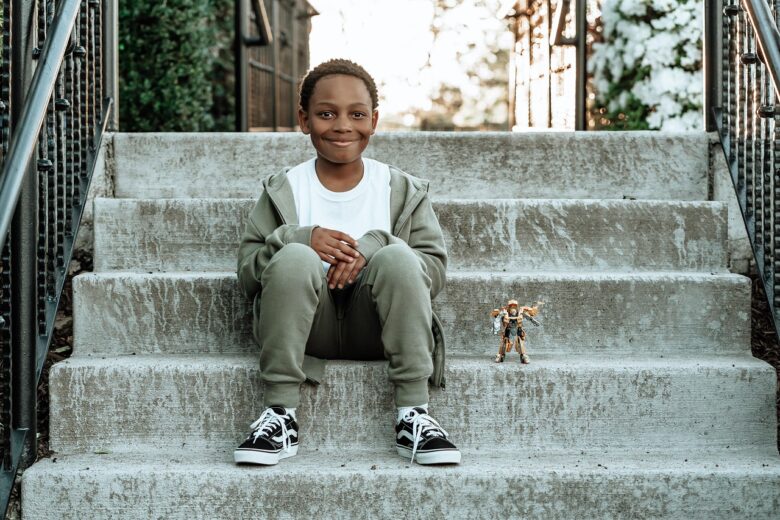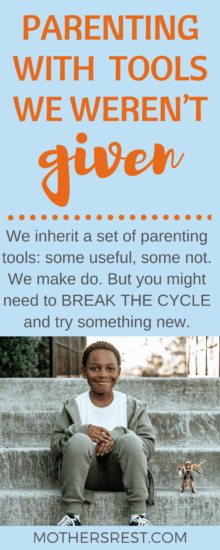By Courtney, guest blogger
Parenting is wild, y’all. It’s like being handed a car with no manual, no seatbelt, and a tiny human in the back screaming for snacks. It’s beautiful, exhausting, hilarious, and humbling — sometimes all before breakfast. And if you grew up like I did, at some point, you hit that moment where you start questioning the tools you were handed to navigate this ride.
I recently had a real heart-to-heart (okay, a mildly confrontational convo) with my dad about his parenting style. He was, let’s say… old school. Tough love. A little yelling. A firm belief that children should be seen, not heard. It wasn’t all bad — he taught me resilience, integrity, and the importance of service. But let’s be real, it also left me with some things to unpack. When I became a parent, I had to sit down and take a real look at that toolbox. Some things? Worth keeping. Other things? Needed an upgrade. And the rest? Straight to the trash.
What are parenting tools?
Parenting tools are the habits, strategies, and responses we use to raise our kids. Some we choose intentionally, others we pick up from how we were raised. Some are solid — like setting boundaries or showing love through quality time. Others? Not so much — like using yelling as the main form of discipline or shutting down emotions instead of addressing them.
Want to figure out your own parenting tools? Ask yourself:
How do I react when my kid pushes my buttons?
How do I show love and support?
What discipline and reward systems do I use? How did I learn them?
How do I communicate with my child when things get tough?
When you take a step back, you start seeing patterns — some that serve your family, and some that need tweaking.
Assessing the tools you were given
Think about how you grew up.
What tools did your parents use? Discipline, affection, encouragement? What did that look like in your house? More importantly, how did it shape you?
Here’s a quick exercise:
Make two columns.
On one side, list the parenting methods your parents used.
On the other, write down if it helped you thrive or if you’re still unlearning it.
Be honest. How did those tools make you feel? Independent? Anxious? Confident? Still untangling some things in therapy?
Here’s a few examples of what your list might look like:
Tool: Yelling as discipline
Effect: Quick obedience, but also an ingrained fear of conflict.
Tool: Tough love, minimal affection
Effect: Built resilience, but also made emotional vulnerability feel unnatural.
Tool: Humor to diffuse tension
Effect: A great sense of humor, but also a tendency to avoid deep conversations.
When I did this, I realized something: I wanted to keep the humor, ditch the yelling, and add more emotional openness. I wanted discipline to be about teaching, not just reacting. And I wanted my kids to know they could come to me, no matter what.
Practicing with new tools
Here are some of the things I’m trying out. To break the cycle and be the parent my boys need.
Using a Buffer: The Power of the Pause
Now, let’s keep it real — changing how you parent doesn’t happen overnight. One minute, you’re vibing, feeling like a calm, intentional parent, and the next, your mom’s voice is coming out of your mouth like “because I said so!”
That’s where the buffer comes in.
Instead of reacting in the heat of the moment, I’ve learned to pause. Walk away, take a breath, put a pin in the situation. I don’t need to have the perfect response in the moment — I just need to have a better one.
Some go-to phrases I’ve started using:
“Give me a second to think before I respond.”
“Let’s talk about this when we’re both calm.”
“I need a minute. We’ll revisit this soon.”
And you know what? It works. It gives me time to respond instead of react, and it models emotional regulation for my kids — something I wish I had learned earlier.
No judgment, just growth
Nobody hands you a “How to Parent Perfectly” guide when you have kids. We inherit a set of tools: some useful, some outdated. And we make do. The key is to assess, adjust, and give ourselves grace.
I don’t fault my dad for how he parented — he did the best he could with the tools he was given. But now? I get to choose differently. I get to refine, improve, and break cycles instead of repeating them.
So if you ever feel like you’re getting it wrong, just remember: the fact that you’re thinking about this means you’re already on the right track.
Take a breath, use the buffer, and trust that you’re learning. Just like your kids.
How are you breaking the cycle and writing a new parenting script? Comment below or on Facebook at MothersRest.
About the guest blogger, editor’s note:
Courtney is a proud boy mom with two active sons, ages 2 and 6, who share a serious love for all things sports. Most Saturdays, you’ll find her on the sidelines of a basketball court cheering loud while her husband coaches and her oldest runs the court (with the toddler trying to keep up). With a background in marketing and a passion for storytelling, Courtney shares honest reflections on motherhood: the messy, magical, and meaningful. She finds joy in organizing, traveling, and connecting with other moms who are figuring it out one day at a time.
Photo credit: Alisa Dyson from Pixabay

